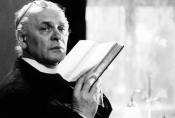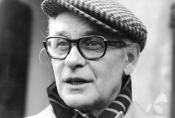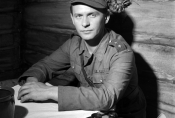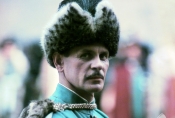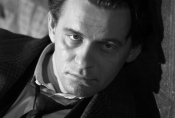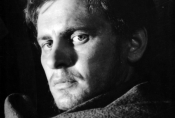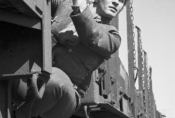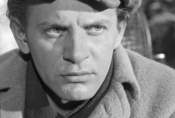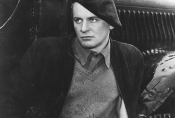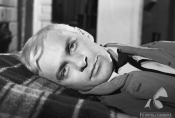Tadeusz Łomnicki
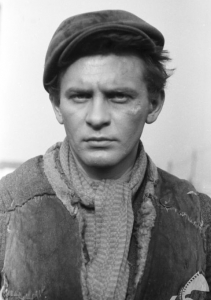
Maja Bojarska, the wife of Tadeusz Łomnicki, wrote in her book “King Lear is dead,” “In October 1974, I met a monster – someone who could do everything on stage. And a maniac who insisted that all that was not enough.”
He was born on July 18, 1927 in Podhajce near Lviv and died on 22 February 1992 on the stage of the Nowy Theatre in Poznan, during one of the final rehearsals for King Lear. A graduate of the Theatre Department at the Stary Theatre in Krakow (1946) and the Directing Faculty at the National Theatre School in Warsaw (1954, graduated in 1965). Actor of several theatres: Miejski in Katowice (1946-1947), Dramatyczny in Krakow (1947-1949), as well as Warsaw’s Współczesny (1949-1952, 1957-1974), Narodowy (1952-1957), Na Woli (1975-1981), Polski (1981-1982), and Studio (1984-1988). In 1988, he decided to leave his permanent position and only guest-starred in the Dramatyczny, Powszechny and Współczesny theatres. He was also an outstanding teacher, and in the years 1970-1981, he served as the rector of the Warsaw Theatre Academy.
He appeared on film for the first time in 1946, in the small role of Kuba in Dwie godziny/Two Hours by Stanisław Wohl and Jerzy Wyszomirski (the film was released in 1957). He played his first major role – as Lutek Kozlowski – in Piątka z ulicy Barskiej/ Five from Barska Street (1953) by Aleksander Ford, based on the famous novel by Kazimierz Koźniewski. Next, he was cast as Stach in Andrzej Wajda's film debut Pokolenie/Generation (1954), based on the book by Bogdan Czeszko, and devoted to the fate of the Warsaw youth associated with the left-wing resistance movement. The film heralded the end of socialist realism in Polish cinema and the arrival of the Polish Film School. In one of the flagship films of this movement, Andrzej Munk’s Eroica (1957), set in the reality of a POW camp, Łomnicki portrayed one of the officers. The following year brought another interesting role as “Partisan” in Baza ludzi umarłych/The Depot of the Dead (1958) by Czesław Petelski, set in a depot somewhere in Bieszczady, where a group of men rejected by society work with timber under extremely difficult conditions.
He was often cast in films set during the war or soon after it; he was Lieutenant Jan in Pierwszy Dzień wolności/The First Day Of Freedom (1964) by Aleksander Ford, Major Świętowiec in Potem nastąpi cisza/Silence Shall Follow (1965) by Janusz Morgenstern, Stefan Starzyński the heroic mayor of Warsaw, in Gdziekolwiek jesteś, Panie Prezydencie/Wherever You Are, Mr. President (1978) by Andrzej Trzos-Rastawiecki, or the count in Klucznik (1979) by Wojciech Marczewski. He gave an excellent performance (along with his co-stars) in Życie raz jeszcze/Life Once Again (1964) by Janusz Morgenstern; set in the first post-war years, it is the dramatic story of three people who are close to one another – an ardent communist (Tadeusz Łomnicki), a Polish RAF pilot (Andrzej Łapicki), and a youth activist (Ewa Wisniewska).
He was also comfortable in a contemporary setting, as evidenced by his performance as Bazyli, a doctor by trade and a drummer by passion, in Niewinni czarodzieje/Innocent Sorcerers (1960) by Andrzej Wajda, the fascinating story of a chance meeting between a man and a woman who pretend to be cynical and indifferent and lose their chance for authentic feelings. Another contemporary film in which he starred was in Ręce do góry/Hands Up (1967, premiered in 1981) by Jerzy Skolimowski, set at a university reunion; Łomnicki played the character nicknamed “Opel Rekord.” A group of erstwhile friends decide to visit one of their colleagues who did not make it to the reunion. A night journey on a freight train is filled with alcohol and memories. In the morning, it turns out that the train wagon never actually moved as it was standing on a siding all night. Łomnicki gave several powerful performances in which he voiced his protest against the oppressive reality of the time: director Jerzy Burski in Człowiek z marmuru/Man of Marble (1976) by Andrzej Wajda, the chief of a hospital department in Kontrakt/Contract (1980) by Krzysztof Zanussi, or an old communist called Werner in Przypadek/Blind Chance (1981) by Krzysztof Kieslowski.
Still, he earned true popularity for his role as the Little Knight in Pan Wołodyjowski/Fire in the Steppe (1969) and Potop/The Deluge (1974) based on the novels of Henryk Sienkiewicz and filmed by Jerzy Hoffman. Seventeen years after the actor's death, he is still remembered for that performance which was deemed the best role in a Polish historical costume film of all time and awarded the Golden Duck award (2009). When the weekly “Polityka” organised a survey asking readers to name the most important Polish actor of the twentieth century, Tadeusz Łomnicki came first (1998).
In 2000, when talking about his and Łomnicki’s early careers, Andrzej Wajda said, “When I started working on Pokolenie/Generation, I had no idea how to work with actors. Łomnicki gave me the chance to fill in this gap of my education at the very beginning of my career. Coming to the film set, he started with an analysis of the character and then marked the various stages of development. He had the gift of predicting the ending that was the dramatic consequence of the whole story.”
Selected filmography
-
1957
HEROISM (EROICA)
reż. Andrzej Munk
-
1958
THE DEPOT OF THE DEAD
reż. Czesław Petelski
-
1960
INNOCENT SORCERERS
reż. Andrzej Wajda
-
1967
HANDS UP
reż. Jerzy Skolimowski
-
1974
THE DELUGE
reż. Jerzy Hoffman
-
1976
MAN OF MARBLE
reż. Andrzej Wajda
-
1981
BLIND CHANCE
reż. Krzysztof Kieślowski
